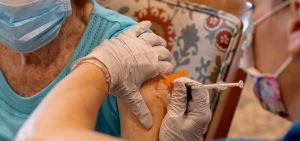A study by Ohio University researchers suggests ways to overcome COVID vaccine hesitancy
By: Gabriel Scotto
Posted on:
ATHENS, Ohio (WOUB) — A study by two Ohio University researchers found that people opposed to getting vaccinated against COVID-19 can be persuaded, but it requires a targeted approach.

Berkeley Franz, medical sociologist and assistant professor of community medicine, and Lindsay Dhanani, assistant professor in psychology, reviewed multiple studies on vaccine hesitancy among both the general population and within specific groups.
“We tried to come up with estimates of who was most likely to take the vaccine, based on a variety of demographic factors, occupational factors and other kinds of identity factors, to try and make estimates about which groups had the most vaccine hesitancy,” Franz said.
Franz and Dhanani’s analysis demonstrated that Republicans and African Americans were less likely to receive COVID-19 vaccinations and that men were more likely to say they planned on getting vaccinated than women, but that women received vaccinations at higher rates than men despite expressing more hesitancy about getting vaccinated.
However, the most important find of Franz and Dhanani’s analysis was that vaccine hesitancy wasn’t static and that those who were hesitant to get vaccinated could be convinced with the proper messaging. “You saw vaccine hesitancy changing over time, particularly in racial groups,” Franz said.
Any outreach to reduce vaccine hesitancy must be tailored to address the concerns of specific populations. Franz used the example of African Americans, who have historically received substandard medical care or have been taken advantage of by the medical profession.
Even before the introduction of the COVID-19 vaccine, these concerns resulted in African Americans having higher levels of vaccine hesitancy than white Americans. African American vaccine hesitancy was also driven by a reluctance to get vaccines in white neighborhoods or institutions they may not have felt safe in.
“What we found was there was a particular messaging strategy around acknowledging past medical mistreatment and experimentation and emphasizing what kinds of ethical safeguards are put in place to prevent African Americans from being manipulated as part of the medical research process,” Franz said.
While African Americans have a distrust of vaccinations in general, Republican vaccine hesitancy was specific to the COVID-19 vaccine. Franz argues Republican vaccine hesitancy was driven by the politicization of COVID-19 and the misinformation surrounding it.
“There’s been a lot of evidence that misinformation related to COVID-19 has been disproportionately targeted towards Republicans as opposed to people with other kinds of political leanings,” Franz said. “Exposure to that misinformation could explain why vaccine attitudes were different among Republicans.”
Another finding was the disparity in men and women’s vaccination rates. “Men are more likely to say they wanted to get vaccinated but are less likely to actually get vaccinated,” Franz said. Meanwhile, while women were more likely to express hesitancy, they were also more likely to get vaccinated.
Franz argues this disparity can be explained the fact that men are less likely to go to the doctor in general and receive preventive healthcare services than women. “I think there’s something going on with gender roles and the way people express fears and take advantage of healthcare services available to them,” she said.
Properly designed outreach and education programs have proven effective in reducing vaccine hesitancy. Franz cites the fact African Americans are now getting vaccinated at higher rates than rural white Americans.
“I think public health leaders must learn you’re going to have to do a variety of interventions that are based on the specific concerns,” Franz said. “People have different reasons for refusing the vaccine and so interventions need to change based on that.”

